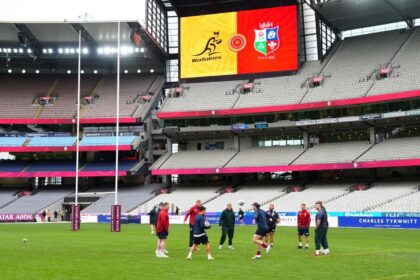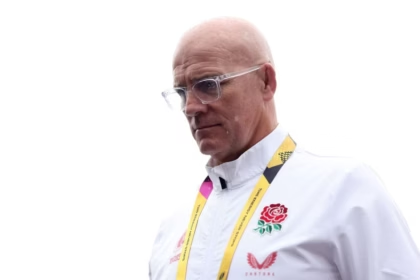The Rebel League R360: A Threat to International Rugby?
Rumors and news about the R360 rugby league, a competition considered rebellious, continue to generate expectation. It is reported that the league has secured funding for three years, with the intention of starting in 2026. However, the situation has become considerably complicated.
The preconditions to the contract stipulated that the funding had to be ready before October 1st. 200 contracted players were informed that the deadline had been met and that the funding was in place. However, the league has suffered a major blow following the announcement of several major unions. These have stated that any player participating in the rebel league will not be eligible to represent their national teams, which would essentially exclude them from the 2027 Rugby World Cup in Australia.
Wallabies center Len Ikitau has already expressed his unwillingness to join the competition if that means missing the World Cup in his country.
My agent knew that my priority was to stay in England and give myself the opportunity to play for my country and, hopefully, go to the World Cup. Most players, when their contracts end, have options, but from the beginning I was very clear that I wanted to stay in England and I am very happy with my decision to stay in Northampton.
Fin Smith, Northampton and England fly-half
The league, led by former England center Mike Tindall, Bath executive Stuart Hooper, Mark Spoors from Wasserman, and former LIV Golf lawyer John Loffhagen, seeks to position itself above club rugby.
The competition plans to include eight men’s teams and four women’s teams, with a condensed season format. The matches would be played in “grand prix” style events around the world, in a 16-match competition.
The concept is inspired by the Indian Premier League (IPL) and LIV Golf as sports disruptors. The league is reported to have received interest from investors in the Premier League, Formula 1, and the NFL.
Financing and Target Players
The competition’s funding comes from investment funds dedicated to sports and private investment from Saudi Arabia, the United States, and the United Kingdom. According to reports, the league has received the necessary funding to begin in 2026 and aims to be profitable by 2027.
Rugby and rugby league players from around the world have been contacted, with contract offers that could reach 12 million Australian dollars over a three-year period. Some pre-contracts could be worth up to 1.5 million Australian dollars.
The competition is also targeting players from the Australian NRL, with Reece Walsh and Nathan Cleary on the list. Other NRL players, such as Cameron Munster, Ryan Papenhuyzen, Xavier Coates, Payne Haas, Deine Mariner, Roger Tuivasa-Sheck, Zac Lomax, and Jye Gray, are rumored to have been contacted.
Haas reportedly had a meeting scheduled with the league in October to discuss a possible code change, but delayed the meeting. The NRL has taken extraordinary measures, setting 10-year bans for any player who joins R360, and the same sanction for agents who facilitate these movements.
Antoine Dupoint, the French scrum half, has also been contacted, as well as Michael Cheika, the former coach of the Wallabies and Argentina. Springboks, All Blacks, and Pumas superstars have also been targeted.
R360 has stated that its new format “would greatly reduce the burden on players and capture the attention of a new generation of fans worldwide”.
Eligibility and International Representation
One of the most significant developments for the league is the joint declaration of eight of the main rugby unions (England, Ireland, Scotland, France, Italy, New Zealand, Australia and South Africa), which warn that any player who signs with the rebel league will not be eligible for international selection.
The unions accused the league of seeking benefits for a small group, exposing the foundations of the game. In addition, they claimed not to have been informed of R360’s plans regarding the well-being of the players or how the competition would fit into the international calendar.
The Welsh Rugby Union, although it did not sign the statement, stated that players who join the league could lose eligibility for national selection.
The rebel league criticized the joint declaration and stated that it wants to collaborate with the global agenda.
R360 has plans to take place in locations such as the Tottenham Hotspur Stadium, the Nou Camp in Barcelona and the MorumBIS in Sao Paulo, as well as New York and Los Angeles. The franchises are expected to be located in London, Miami, Tokyo, Dubai, Boston, Cape Town, Lisbon and Madrid.
When and why is R360 developed?
Initially, the competition aimed for two game windows from April to June and from August to September, but this has changed. Now, the league is determined to start in October 2026. However, this could be delayed, as the competition has not yet obtained approval from World Rugby.
While the competition has secured funding for at least three seasons, the start in October would coincide with the new global women’s WXV series, and future editions could overlap with the Rugby Championship or even matches leading up to the 2027 Rugby World Cup.
An official approval request that was to be discussed by the World Rugby council on September 23 was withdrawn, and the competition postponed its sanction request until at least June of next year, raising doubts about whether it can launch on time.
Rugby worldwide faces difficulties, with at least 12 professional teams having gone bankrupt in recent years, including the Melbourne Rebels in Super Rugby Pacific and Wasps and Worcester RC in the Premiership. In addition, seven out of ten teams in the United Kingdom owe more than they own.
Furthermore, broadcast agreements, such as those seen in Australia and the United Kingdom, have relegated rugby behind a paywall, which has reduced spectator participation.
According to Tindall, “rugby is feeling the consequences of recent years with poor financial management, declining investment in the club game, and a product that is struggling to evolve. Clubs around the world are feeling the pressure and are being propped up by the international game. Rugby’s lack of innovation and ability to change risks losing its appeal to new audiences and its younger market.”




